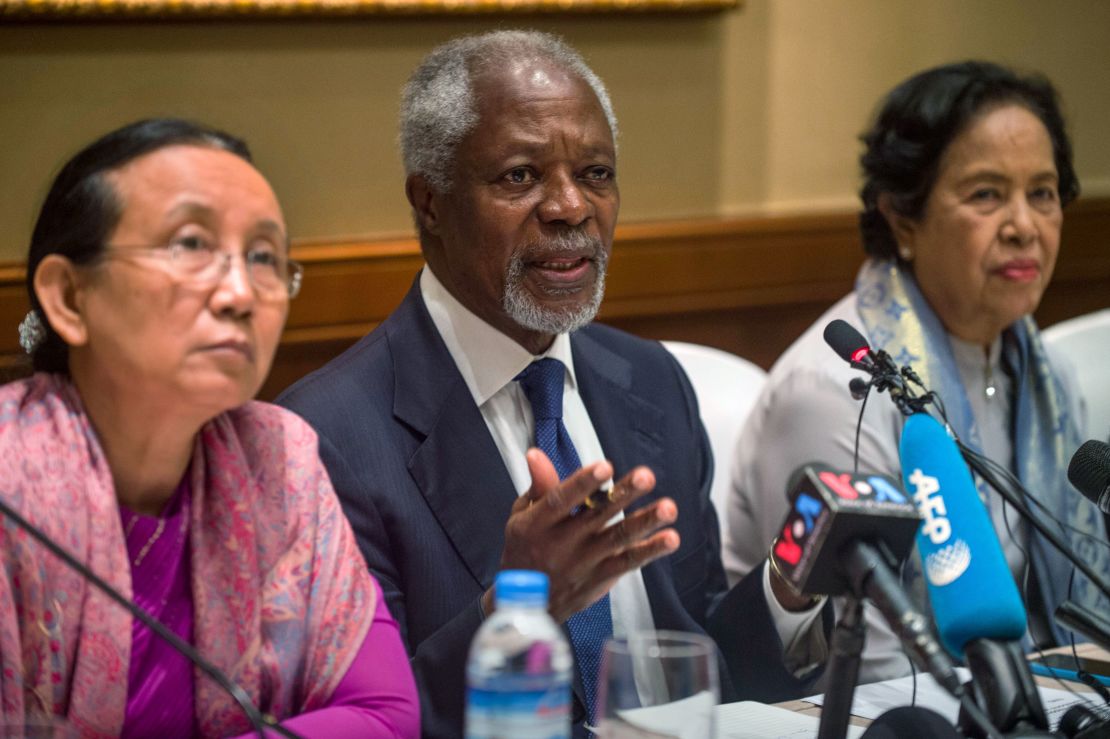Story highlights
Former UN chief 'deeply concerned' by reports of human rights abuses
Annan met with Myanmar's State Councilor Aung San Suu Kyi
Former United Nations Secretary General Kofi Annan says he hopes humanitarian workers and journalists anxious to investigate reports of murder and rape in Rakhine State would be given access “soon.”
Annan has just completed a week-long tour of Rakhine State’s volatile north with members of an advisory commission set up between the Myanmar government and the Kofi Annan Foundation.
The predominantly Muslim Rohingya, who live in Myanmar’s Rakhine State and regularly face persecution and violence, have been described as “the most oppressed people in the world” by a UN representative.
Speaking on Tuesday evening, Annan said he had visited parts of Rakhine State which had been affected by the recent crackdown.
“We are deeply concerned by the reports of alleged human rights abuses. We stressed in all our meetings that wherever security operations might be necessary, civilians must be protected at all times,” he said.
When asked by CNN when human rights groups and media would have access to the area, currently denied by Myanmar’s government, Annan said he had discussed it with the country’s leaders and hoped they would be allowed in “fairly soon.”

“We had the opportunity to discuss at high levels and we were told that humanitarian access will be given for aid to reach the needy. The Commander in Chief did tell us there are areas which they are still clearing and would free (them) up for such operations as soon as a clearance is done,” he said.
The former UN secretary general told journalists he had met with State Councilor Aung San Suu Kyi as well as Myanmar’s President Htin Kyaw.
Rights groups allege Rohingya killings
Violence in Rakhine State flared up in October, after more than a dozen Myanmar soldiers and police were attacked by 300 men armed with knives and pistols.
In response, Myanmar’s military began an offensive inside the state, resulting in what human rights groups describe as murder, rape and destruction of villages.
UN’s Special Adviser on the Prevention of Genocide, Adama Dieng, expressed alarm in a statement released in November to reports of a crackdown against the country’s Rohingyas.
“These allegations must be verified as a matter of urgency,” he said. “If they are true, the lives of thousands of people are at risk.”
Despite rights groups reporting more than a hundred deaths, the numbers are impossible to confirm as the government has banned journalists and observers from visiting the province.
Rakhine Commission formed
Annan first arrived in Myanmar about a week ago to meet with community leaders across the country, along with members of his Advisory Commission on Rakhine State.
The commission was set up in August, before the recent violence, and was created to find “lasting solutions” to the situation in the Rakhine State, according to the government.
The Rohingya are a stateless ethnic minority who regularly face persecution – the official position of Myanmar’s government doesn’t recognize the term “Rohingya” and instead says they are illegal Bengali migrants.
On November 15, Annan issued a statement in which he said he was deeply concerned by the new killings and asked for security to follow the law.
“Violence will not create an environment conducive to peace and inter-communal cohesion, which is a prerequisite for economic progress and prosperity,” he said.



